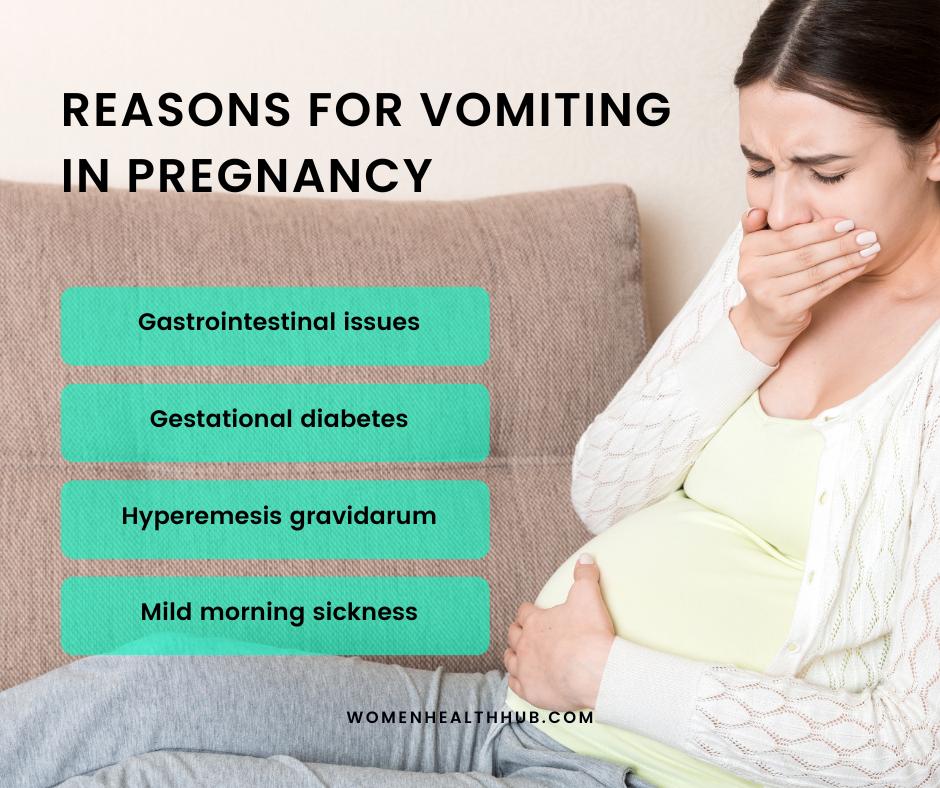Hey there! This post may contain affiliate links. As an Amazon Associate, I earn a teensy commission from qualifying purchases when you buy through these links (at no additional cost to you). For more info, please check the full disclaimer.
Nausea and vomit during pregnancy affect up to 80% of women, making it a common issue. This condition is also known as morning sickness.
The good news is, that even though vomiting during pregnancy can be unpleasant and uncomfortable, it usually does not harm the baby.
But what exactly causes vomiting during pregnancy and how can you cope with it?
Let’s uncover this in this blog post.
Why Do Women Vomit During Pregnancy?
One reason for vomit during pregnancy is hormone changes.
Pregnant women produce a lot of human chorionic gonadotropin (hCG), which can make them feel sick in the morning. Other hormones like estrogen and progesterone can also cause nausea and vomiting. These hormones make the muscles in their stomach and intestines relax, which can lead to food coming back up.
The levels of hCG rise rapidly in the first trimester (1-3 months of pregnancy), and then become stable. This is why nausea is more common in the first trimester.
Some women are more prone to feeling nauseous because of their genes. If a mother has had a difficult pregnancy, then there are chances that the daughter will have a difficult pregnancy too.
Read More: First Trimester of Pregnancy Guide
Pregnancy Conditions that Cause Vomiting
In most cases, nausea and vomiting during pregnancy are mild and go away on their own by the second trimester. Morning sickness is the most common cause of nausea and vomiting during pregnancy. It usually begins around the sixth week of pregnancy, lasting until the 12th week or longer in some cases.
Hyperemesis gravidarum is a severe form of morning sickness that affects about 1-3% of pregnant women. It is characterized by persistent nausea and vomiting, leading to dehydration, weight loss, and electrolyte imbalances. Women with hyperemesis gravidarum may require hospitalization and treatment with intravenous fluids and medications.

You may also experience nausea in pregnancy because of gastrointestinal issues: such as acid reflux, gastritis, or food poisoning.
Women with symptoms of gestational diabetes are also prone to nausea, vomiting, frequent urination, and increased thirst.
Read More: Second Trimester of Pregnancy Guide
What Triggers Vomiting In Pregnancy?
Some women find that certain foods or smells make them nauseated. Common triggers include strong smells, such as perfume or cooking odors, and certain foods, such as fatty foods, spicy foods, or foods with a strong odor.
Skipping meals or eating too little can also lower your blood sugar levels and make you nauseous.
Dehydration is also a trigger for vomiting in pregnancy. This is because when the body is dehydrated, it can’t get rid of toxins as easily.
Women who are prone to motion sickness may also be more likely to experience nausea and vomiting during pregnancy.
Another risk factor is stress and lack of sleep. When you’re sleep-deprived, your body produces more of the stress hormone cortisol, which can trigger nausea and vomiting.
Read More: Reasons to Drink Coconut Water in Pregnancy
Tips to Treat Nausea During Pregnancy
While nausea and vomiting in pregnancy may not be completely preventable, there are some things you can do to ease your discomfort and avoid complications.
- Eat small, frequent meals: Eating smaller meals more frequently can help maintain stable blood sugar levels and reduce nausea.
- Stay hydrated: Drinking plenty of water throughout the day can help alleviate nausea and prevent dehydration.
- Avoid triggers: Identify and avoid any specific smells or foods that seem to trigger your nausea.
- Get plenty of rest: Make sure you’re getting enough sleep and taking breaks throughout the day to rest and recharge.
- Ginger: Ginger has been shown to help alleviate nausea in some pregnant women. Try sipping on ginger tea or sucking on ginger candies.
- Acupressure: Wearing acupressure wristbands or applying pressure to specific points on the body may help reduce nausea.
If your nausea and vomiting are severe or persistent, it’s essential to consult your healthcare provider for further evaluation and treatment options.
Bottomline
Nausea and vomiting in pregnancy are common and usually harmless symptoms that will subside over time. However, they can also affect your quality of life and well-being. By following these tips and consulting your doctor when needed, you can manage your nausea and vomiting during pregnancy and enjoy this special time in your life.
References:
- https://www.dovepress.com/risk-factors-of-prolonged-nausea-and-vomiting-during-pregnancy-peer-reviewed-fulltext-article-RMHP
- https://onlinelibrary.wiley.com/doi/10.1111/jmwh.12451








